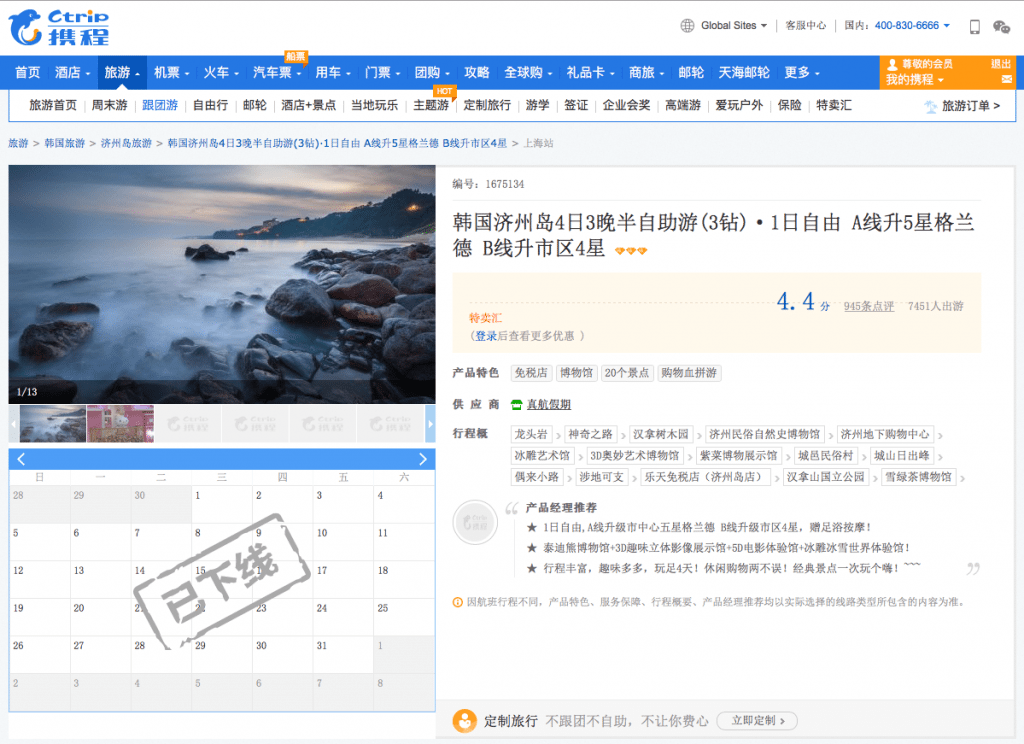Update: August 18, 2017#
Following the escalation of tensions between the United States and North Korea over missile tests, Joint Chiefs of Staff Chairman General Joe Dunford announced in a press conference on August 14 that the United States is working with South Korean to test some technical issues of the THAAD system before making it fully operational on the Korean peninsula.
South Korea’s cooperation on pushing forward the deployment of THAAD is deemed strategically significant for the U.S. to ensure a denuclearized Korean peninsula, as highlighted in a joint op-ed published by Secretary of Defense Jim Mattis and Secretary of State Rex Tillerson in the Wall Street Journal on August 13.
Meanwhile, tours to South Korea are still unavailable for purchase in the Chinese market. However, Chinese online travel agents such as Ctrip and Fliggy have again started selling flight tickets and hotel rooms in South Korea.
While basic travel products are now available for purchase, tour bookings and other travel arrangements remain unavailable. For example, cruise itineraries sold in China have replaced South Korean stops with Japanese ports or Hong Kong.
For prospective travelers shopping for travel products through China's many online and offline agencies, South Korea travel options are hidden and have to be actively searched rather than found promoted with other destinations.
For Chinese mass market tourists, South Korea very much continues being a non-option until the quasi-travel ban is lifted. With the extra hassle of planning and purchasing itinerary items and tours without the help of travel agents, independent travel to South Korea is possible for China's more independently-minded travelers.
After months of aggressive rhetoric from China against South Korea’s intended deployment of the U.S. THAAD anti-ballistic missile defense system, the deployment has now begun, and China swiftly retaliated against South Korea with a tourism ban. The ban could have dire consequences for South Korea’s tourism and retail industries, but also sends shockwaves throughout the region—where many countries, just like South Korea, have seen the enormous flows of Chinese tourists reorient both the tourism and retail sectors. It may even cause overall Chinese outbound tourism to drop for the first time.
What’s THAAD?#
The Terminal High Altitude Area Defense system, or THAAD, is a U.S. designed anti-ballistic missile system that detects and intercepts incoming ballistic missiles, and in the case of South Korea, it is intended to defend the country against potential attacks from North Korea. The system has been deployed at different sites in the United States and Guam, and deals have also been signed to sell it to countries in the Gulf.
Deployment of THAAD in South Korea has been in the works for months, and talks began under the Obama administration. Escalating rhetoric and a growing number of missile tests in North Korea during 2016 hurried the potential deployment, and a deal was struck in July 2016 to deploy the system.
What’s Lotte’s role in all of this?#
One of the proposed deployment sites in South Korea was on a golf course owned by the South Korean conglomerate Lotte, which has major investments in China, as well as runs many businesses in South Korea that cater to Chinese travelers. Lotte was offered a land swap deal that would result in it giving up its golf course in exchange for another piece of land, a deal which it gave its final approval earlier this month. Being the only Korean company directly linked to the potential deployment of THAAD in South Korea, Lotte has been subject to intense criticism in Chinese media—as well as subject to business-related problems in China after it was revealed that it’s linked to THAAD through the potential land swap.
How is THAAD causing tourism to drop in South Korea?#
The China National Tourism Administration, the government body responsible for Chinese tourism, has forbidden both online and offline travel agencies to sell trips to South Korea. The ban affects all types of Chinese tourism to South Korea, i.e., group travel, individual travel, and cruises. Some analysts have predicted that this will cause up to a 70 percent drop in Chinese arrivals.
In addition to forbidding travel agencies to sell South Korea-related products, the Chinese government has also instructed Chinese airlines to reduce the number of round-trip flights operated between China and South Korea. Korean carriers have also begun reducing the number of flights between the two countries. Cruise operators such as Carnival Corporation and Royal Caribbean have also canceled port calls in South Korea for its China-based cruises, quoting "recent developments regarding the situation in South Korea" as the reason for the cancellations. Some of the port calls in South Korea have been replaced by new port calls in Japan.
What does it mean for South Korea?#
South Korea has become a big beneficiary of the growth of global Chinese travel, and the popularity of its pop culture in China, as well as its geographic proximity to China, has made it one of the foremost destinations for Chinese tourists. In 2016, it was the second most visited international destination by Chinese tourists (not including Hong Kong and Macau). The result is that Chinese tourists are dominating the Korean tourism industry, and have accounted for almost half of all foreign visits to South Korea in recent years.
Because of the importance of Chinese tourists to South Korea’s tourism industry, a large part of the greater tourism industry will be affected by the recent travel ban. South Korean tourism businesses that have specifically catered to Chinese tourists will be particularly affected by the ban, especially those serving Chinese tour groups—which will now be reduced to zero. Jeju Island, a South Korean destination so popular with Chinese tourists that it introduced a separate visa-on-arrival scheme for Chinese visitors stands to lose a majority of its visitors.
In addition to traditional tourism businesses, retail companies have also taken a beating in the stock market following the travel ban, as the number of Chinese customers at South Korean retail stores will be greatly reduced. For the travel retail sector, the ban is even more detrimental to the bottom line: according to the Korea Herald, Chinese customers account for 70 percent of South Korean duty-free stores annual revenue.
Will Chinese independent travelers still visit South Korea?#
While Chinese independent travelers will technically be able to visit South Korea just like before, Chinese travel agencies can no longer sell any products related to South Korean travel—whether it’s flight tickets, booking hotels, or making visa arrangements. Instead, Chinese independent travelers will have to use non-Chinese channels to make their travel arrangements for South Korea, making it much more difficult for the average independent traveler. A reduction of the number of flights operated between the two countries also limits options, and cruise travel is completely out of the picture. Propaganda and the negative social stigma now associated with leisure travel to South Korea also serve as discouragements for the potential independent traveler. On the South Korean side, visa policies remain unchanged, and Chinese nationals with the correct travel documents are not barred from entry.

What will South Korea do now?#
As the THAAD conflict is unfolding, South Korea is also caught up in the recent impeachment of former President Park Geun-hye. The country will hold presidential elections on May 9, and the deployment of THAAD and China’s retaliation are likely to be hot-button issues during the election campaign. The election could help reset South Korea’s China relations and tourism ties between the two countries.
Even before China imposed the travel ban, South Korea’s tourism authority, the Korea Tourism Organization, was making efforts to diversify the country’s tourism industry away from China. These efforts are likely to be accelerated under the current circumstances. South Korean tourism officials may also take the opportunity to look to the example of Taiwan, which faced tourism retaliation from China after the election of the independence-leaning Democratic Progressive Party’s presidential candidate Tsai Ing-wen. Despite a plunge in arrival numbers from China, Taiwan broke a new record in total arrivals in 2016—fueled by the growth in arrivals from Japan, South Korea, and Southeast Asian nations. Even if the travel ban gets lifted, China’s retaliation over THAAD makes it clear to South Korea that diversification of its tourism industry is paramount to future stability.
What does it mean for the rest of Asia?#
As Jing Travel previously reported, the sudden and dramatic reduction of Chinese travel to South Korea could pose a threat to the overall growth of Chinese travel in 2017, but may also present an opportunity for other countries in the region to replace South Korea on Chinese travelers’ itineraries. Japan has already picked up some of the Chinese cruises originally bound for South Korea, and canceled flights are likely to be reinstated on other short-haul routes, i.e., between China and other Asian destinations.
China’s sudden travel ban also sends a strong message to countries in the region with a similar, Chinese-heavy, tourism mix to that of South Korea. While immensely profitable and a source of double-digit tourism growth, Chinese tourism also gives China substantial leverage that it, in the cases of both Taiwan in 2016 and South Korea in 2017, is not shy to use as both a carrot and stick in reaching its political goals. Even though many countries in the region are busy preparing for growing numbers of Chinese visitors, preparing contingency plans for a possible sudden drop in Chinese arrivals is also starting to look like something worth prioritizing.
